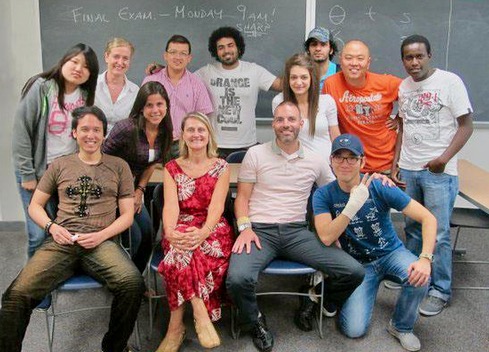|
The first time I was asked to mentor a teaching intern, I was
honored—I was still an adjunct instructor at a university, not full-time
faculty—but also a bit intimidated. Could I be a “perfect” enough
teacher to be a role model for someone learning how to teach ESL? It
didn’t take me long to figure out that being a perfect teacher is not
the goal at all, and though one hopes to use best practices in the
classroom, mentoring an intern means showing the real world of the
classroom: the students, the teachers, the facilities, and the entire
university experience.
If you think about when you did your practice teaching, you
probably spent the first days observing, and that’s what I ask an intern
to do. (I recommend watching not only my classes, but ask colleagues if
the intern can observe a few of their classes during the term.)
Although I teach three classes per term, I ask the intern to assist me
with just two of them. The intern gets a copy of the syllabi and
textbooks, and we look through them together, talking about the
objectives of the course and how the textbook meets (or doesn’t meet)
those objectives. Interns may also observe the placement process to
discover how students are tested and placed at the different levels in
the ESL program.
Before each class, the intern and I go through my lesson plan,
and I explain why I’ve chosen to do what is in the plan, often with
supplementary materials. The education, of course, mostly happens during
the class, when the intern can see how much you follow the lesson plan,
if you change it during class, how well the supplementary materials
work (or not!), and how the textbook gets integrated. In our 90-minute
classes, the intern also witnesses how an instructor keeps students
engaged with individual, pair, and group work. The intern sees how an
instructor can use the board, the computer, and audio-visual materials,
all while managing the class as a whole.

Sherry Rasmussen with an intern in a class
Will your intern witness certain problems during the class, or
even see you “mess up” at times? I certainly hope so! How else can an
intern see how you fix those problems during that class or mend them in
the next class? Also, if you think back to your interning days: How
would you have felt if you’d had to emulate a seemingly perfect teacher?
How could you ever have felt good enough when it was time to start your
teaching career?
After each class has finished, either immediately afterward or
at the end of the teaching day, we talk about what happened during the
class(es)—all the facets: how well the materials worked, what the
students seemed to learn, how they interacted with each other and the
teacher, how we ended up using the board, and so on. This leads to what
we will want to keep in mind when planning the following lesson, which
may not happen until the next day. Interns often have a variety of
questions and observations that inform your own practice as well as
their own.
Depending on how experienced your intern is and how long your
term runs (ours is 10 weeks), your intern should teach part of a lesson
as soon as possible. Just as you structure your ESL lessons with
appropriate scaffolding, you do the same with your intern, again
depending on that person’s teaching experience. And then, (mostly) let
them go while they teach! Of course, you can step in if the intern needs
help during the lesson, forgets to do an important part, could benefit
from writing something on the board, or so on. However, if the students
are benefitting from the lesson as is, try not to interfere. You can
always talk about the lesson later.
When we do our feedback session after the intern has taught, I
like the intern to express how he or she felt about the lesson and how
well it met the objectives. This can lead into how the practice could be
improved. Of course, just as you do with your ESL students, you select
the most important points to focus on, not all of them, even if the
lesson was a “disaster.” And this is where some of the real-life
learning comes in—how to come back to class the next time to better meet
the needs of the students.
As the term goes on, the intern can get more and more involved:
creating materials, writing quizzes, deciding what should be taught and
how, and executing those lesson plans during class, all with your
feedback. Ideally, by the end of the term, the intern should be able to
manage a complete class with which both you and the intern are happy and
comfortable. An intern also needs to see how students are evaluated
during the term and at the end.
Watching an intern grow and develop as a teacher is incredibly
rewarding. Mentoring reminds us just how complex teaching is and also
how fortunate we are to work in a field that encourages us to continue
educating and stretching ourselves. At the same time, you must recognize
that interns are going to see your good days and bad days. They are
going to hear you complain about some students and rave about others.
They’ll watch you interact with students, colleagues, and the director
of the program. They’ll hear you curse at the photocopier that has
broken down and praise the printer that is finally working. They’ll see
you enthusiastic but also exhausted. In other words, they will see the
real world of teaching ESL, and if you have offered them that
experience, with guidance along the way, you have done your job as a
mentor.
Sherry Rasmussen has been an ESL/EFL teacher and
teacher trainer for almost 30 years, and she currently teaches full time
at DePaul University, Chicago, Illinois, USA. |

